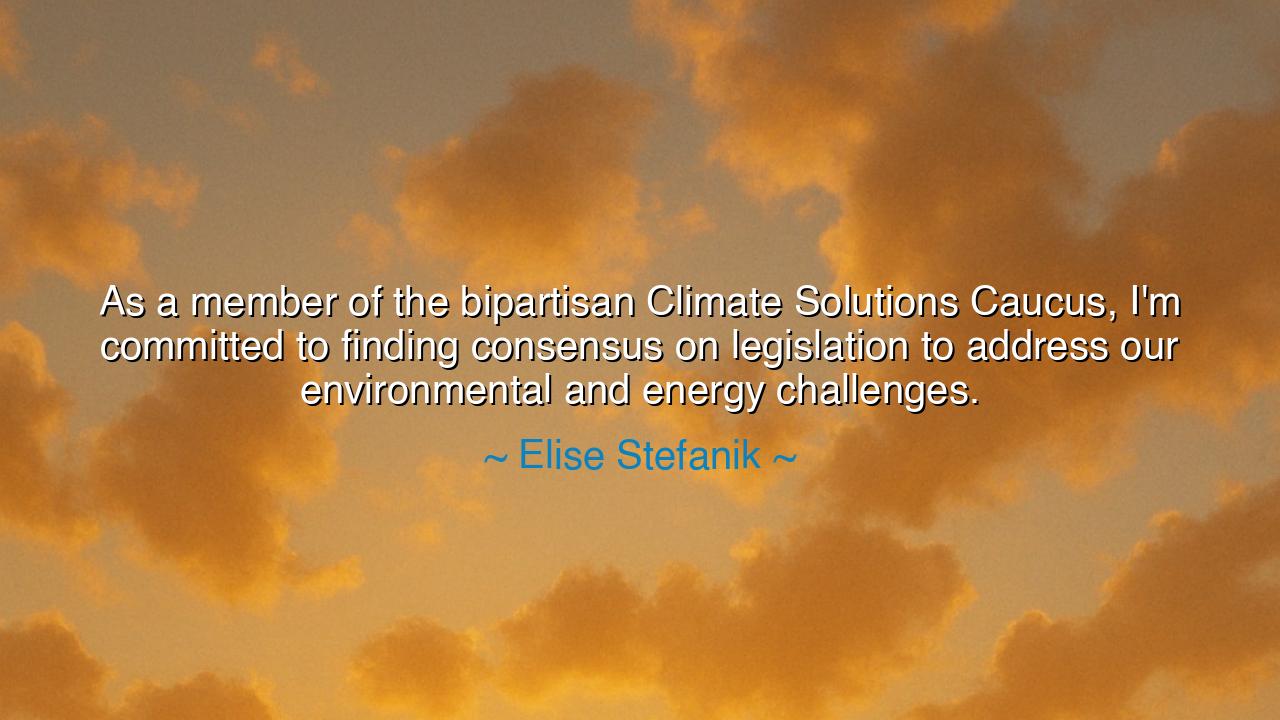
As a member of the bipartisan Climate Solutions Caucus, I'm
As a member of the bipartisan Climate Solutions Caucus, I'm committed to finding consensus on legislation to address our environmental and energy challenges.






In a time of division and contention, Elise Stefanik once declared, “As a member of the bipartisan Climate Solutions Caucus, I'm committed to finding consensus on legislation to address our environmental and energy challenges.” At first, these words may sound political, but beneath them lies a truth as old as civilization itself—the wisdom that progress cannot be born from discord, nor can the earth be healed through pride. Her statement is a quiet call to unity, a recognition that the stewardship of the planet transcends party, ideology, or ambition. It is a reminder that the climate, the air, and the waters do not belong to factions, but to all who draw breath.
The origin of this quote lies in Stefanik’s role within the Climate Solutions Caucus, a rare gathering of lawmakers from both sides of the aisle in the United States Congress. In a landscape of endless debate, this caucus was formed with one sacred goal—to find common ground for the sake of the common good. Her words reflect an understanding that the crises of our age—environmental degradation, energy instability, and the reckless consumption of the earth’s bounty—can only be addressed when humanity stands not as rivals, but as allies. She speaks from the heart of governance, but her message reaches beyond politics; it is the eternal lesson of cooperation, the same that built nations, healed wars, and allowed humanity to endure.
The ancients, too, knew that the world could not thrive when men stood divided. In the days of the Roman Republic, the Senate often fractured under the weight of ambition and faction. Yet it was only through consensus—that sacred middle path between extremes—that the Republic survived its storms. The greatest leaders were not those who shouted loudest for their cause, but those who listened, who wove the many voices of their people into one chorus. Stefanik’s quote carries that same ancient spirit: the belief that true strength lies not in dominance, but in dialogue; not in conquest, but in communion.
When she speaks of environmental and energy challenges, she touches upon the defining struggle of our time—the balance between growth and guardianship. Humanity, in its hunger for progress, has wounded the very earth that sustains it. The seas rise, the forests shrink, the air grows heavy with the breath of industry. Yet no nation, no party, no single people can repair these wounds alone. The climate does not know the language of politics; it responds only to the laws of nature. Thus, Stefanik’s commitment to bipartisanship is more than a political stance—it is a recognition of necessity. Just as the elements coexist in harmony to sustain life, so too must humankind learn to cooperate if it wishes to endure.
Consider the story of the Montreal Protocol of 1987, when nations gathered to confront the depletion of the ozone layer. The world faced a silent catastrophe, yet it was unity, not rivalry, that turned the tide. Leaders set aside borders and pride, agreeing to phase out harmful chemicals for the sake of the atmosphere. Decades later, the ozone began to heal—a rare triumph in humanity’s troubled relationship with nature. This achievement mirrors Stefanik’s belief: that consensus, though slow and difficult, yields results that endure, while division breeds only delay and decay.
Her commitment to consensus is not weakness—it is wisdom. For to seek agreement is not to surrender one’s convictions, but to honor the higher truth that no one soul, no one nation, holds all answers. The earth itself is a teacher of this principle: the forest thrives not because of one tree, but because of the harmony between many. In like manner, societies thrive when their members choose cooperation over contention. The pursuit of shared purpose is the highest form of leadership, the kind that builds not monuments of stone, but legacies of peace and sustainability.
Let this be the lesson her words impart to future generations: that healing the world begins with listening, that progress requires patience, and that unity is not a dream, but a discipline. To care for the planet is to care for one another; to defend the environment is to defend the bond between all living things. Therefore, let each person—citizen or leader—seek the spirit of consensus, to speak less of sides and more of solutions, to measure worth not by victory, but by service.
For as Elise Stefanik reminds us, the challenges before us are vast, but so too is our capacity for cooperation. The wind and the tide obey no party, the sun shines on all without favor, and the earth itself calls us not as opponents, but as kin. If we would heed that call—if we would meet one another in the center of truth—then perhaps humanity may yet find harmony with the planet, and with itself.






AAdministratorAdministrator
Welcome, honored guests. Please leave a comment, we will respond soon